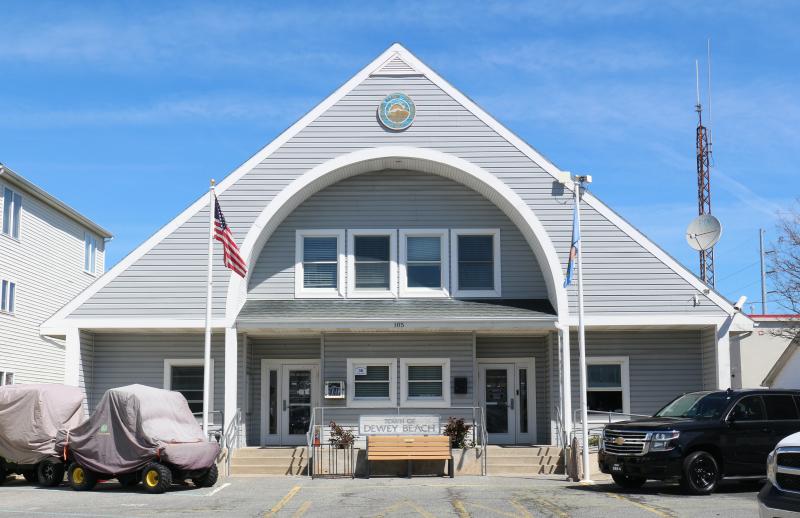Stormwater management, head-in parking requirements set in Dewey
Dewey Beach commissioners voted unanimously July 19 to set head-in only parking spots and establish stormwater runoff management for new construction, but tabled votes on green space requirements and giving lifeguards authority to prohibit potentially dangerous activities on the beach.
Drivers now need to park their vehicles head-in only in angled and perpendicular parking spaces. Town Manager Bill Zolper said there is a problem with folks backing into spaces rather than pulling into them, and Delaware has license plates only on the rear of vehicles.
Commissioners also voted on an ordinance requiring newly constructed and renovated buildings to manage stormwater runoff with gutters and downspouts, calling the move logical.
Green space
Voting was tabled on an ordinance to establish minimum requirements for plantings and open space and to regulate boundaries and materials in driveways and walkways in the Neighborhood Residential zoning district.
Commissioner Gary Persinger said the ordinance arose because people have installed blocks across the entire front yard of their homes, essentially creating a parking lot and not allowing for legal public parking.
To try to prevent this, the ordinance would define green space and increase green space requirements from 15% of the lot area to 25%, Persinger said, so that 1,250 square feet of green space would be required in a 5,000-square-foot lot.
The entire front yard would have to be green space except for a 4-foot-by-18-foot walkway and either one 20-foot-by-18-foot driveway or two 10-foot-by-18-foot driveways, he said, and parking would be prohibited in green space areas. The remaining green space requirement would be distributed between the side and back yard areas, he said.
Existing front yards covered with non-green space materials can remain, Persinger said, except for walkways and driveways; any replacement of those materials would convert the area to green space. No-spill borders would be required on the walkways and driveways to contain materials, he said.
Requirements would only apply to new construction or if the front yard is being renovated, Persinger said. Existing homes would not be affected, he said, and there would be no change to the size of homes that can be built. A home on a 5,000 square foot lot could still be as large as 2,380 square feet, he said, and a pool could still be installed in the backyard with all green space requirements met.
Persinger proposed some changes to the ordinance based on feedback for residents; land left and maintained in its natural condition could be considered green space, and artificial mulches and decorative stone can only be applied in close proximity to plants and shrubs.
During public comment, Cindy Souza said the ordinance would put an undue burden on residents, and parking issues will be resolved this fall when streets are paved and parking spaces marked by the town.
Souza said five homes in the north end have paved the entire front part of their yards, including the public parking spaces. Such homeowners tell drivers they can’t park in the legal public spots, Souza said, and the town has lost $14,000 over 20 days by not enforcing two public parking spots in the north end.
Even though they are public parking spaces, Mayor Bill Stevens said, no one would park in them because the other cars would be blocked in.
Commissioner David Jasinski then asked Town Manager Bill Zolper if the town will commit to clearly marking driveways in the north end even if people complain. Zolper confirmed that driveways in the north end will be marked after streets are paved this fall.
Jasinski said he was concerned the ordinance would create friction between homeowners who follow the rules and those who don’t. He suggested that new construction or a home addition should be the trigger that causes property owners to comply with new requirements.
Commissioner Paul Bauer said he felt the ordinance is selective enforcement by treating one district differently than another. Persinger said it is not unusual to have different requirements in different zoning districts, but asked commissioners if they wanted to do so.
Treating everyone the same is fair, Bauer said, asking if some rules should apply to all residential homes.
Noting there is still some confusion, Persinger suggested tabling the vote and bringing a revised ordinance to the next meeting; Jasinski’s motion to table and post the revised ordinance passed unanimously.
Lifeguard authority
A possible vote on an ordinance that would give lifeguards authority to prohibit activities that pose a danger to public safety was tabled. Stevens said the ordinance arose when a man was flying a drone from the beach and on the beach in windy conditions, and guards didn’t have the ability to stop the activity.
Dewey Beach Patrol Capt. Todd Fritchman spoke in favor of the ordinance. The patrol has always regulated active recreational activities through distancing and positioning games away from passive beach goers and beach entrance points, he said.
Having such an ordinance on the books would allow lifeguards to show beachgoers the law in their beach rule manual without having to call police for assistance in cases when the public talks back, he said. People are complying with lifeguards, Fritchman said, but it would be good to have it on the books.
During public comment, David Moskowitz said the ordinance should spell out the specific prohibited activities like Rehoboth does. A racial minority could get targeted, he said, and someone else doesn’t because the lifeguards won’t know how to enforce it.
Persinger said he agreed the ordinance wasn’t specific enough. Jasinski said he trusted the lifeguards and wanted to give them some authority. Jasinksi said he didn’t want to over-engineer the ordinance, noting the town has nothing that prohibits archery on the beach but people know they can’t do it.
Town Counsel Fred Townsend said it’s a gray area, but there is validity to the argument that the ordinance might need more study.
Commissioners also referred to the planning and zoning commission the review of an ordinance to amend the freeboard height requirement for the elevation of buildings, structures and equipment; a meeting has not yet been scheduled.




















































